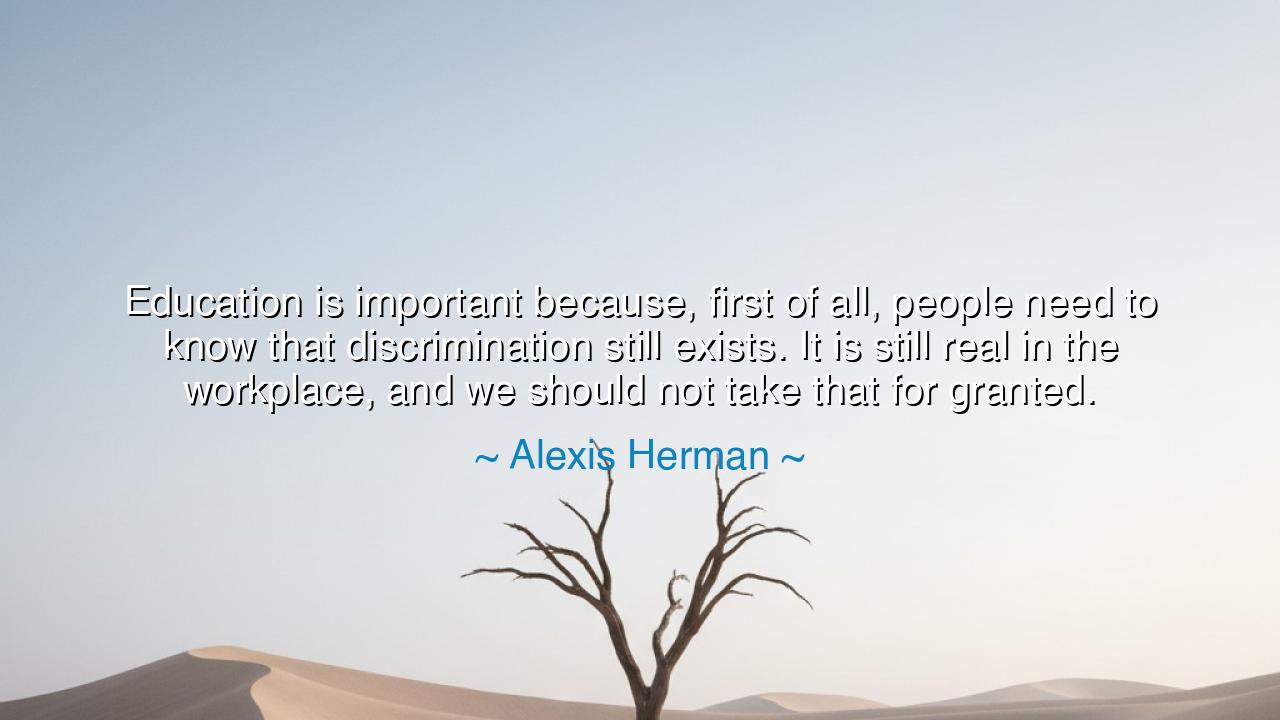
Education is important because, first of all, people need to know
Education is important because, first of all, people need to know that discrimination still exists. It is still real in the workplace, and we should not take that for granted.






"Education is important because, first of all, people need to know that discrimination still exists. It is still real in the workplace, and we should not take that for granted." Thus spoke Alexis Herman, the first African American to serve as U.S. Secretary of Labor, a woman who rose from the struggles of the segregated South to stand in one of the highest offices of the land. Her words are not uttered lightly; they are drawn from the well of lived truth, from a life that witnessed barriers both invisible and unyielding. They remind us that education is not merely the learning of facts, but the awakening of conscience, the unmasking of injustice, and the arming of hearts and minds against the silent poison of discrimination.
The meaning of her words is urgent. Many believe that the battles of equality have been won, that the age of prejudice is behind us, that the workplace is now a sanctuary of fairness. But Herman warns that such thinking is itself dangerous. For discrimination—whether by race, gender, age, or origin—remains a hidden shadow in the halls of labor. To forget this truth, to take progress for granted, is to allow the shadow to grow unchecked. Only through education, through reminding each generation of the struggles that came before, can society remain vigilant and keep injustice from creeping back into power.
History gives us a mirror. Consider the era after the Civil War in the United States. Slavery had ended, and many believed freedom had been secured for African Americans. Yet in the decades that followed, Jim Crow laws spread across the South, and discrimination, reborn in new forms, enslaved minds and bodies through segregation, violence, and exclusion. The hard-won victories of emancipation were not enough; without education and vigilance, freedom was eroded. Herman’s words remind us that what happened then can happen again—progress unguarded will wither.
There are also stories of triumph through awareness. During the Civil Rights Movement of the 1960s, young men and women studied the histories of oppression and trained themselves in nonviolent resistance. They became living proof that education—not only of the mind but of the spirit—could expose injustice and strengthen the will to fight it. Sit-ins, marches, and speeches did more than demand rights; they awakened a nation to the reality that discrimination still existed, even when many denied it. Their power was not just in action but in teaching others to see what had long been ignored.
Herman’s words also point to the battlefield of the modern workplace. Even in our time, women are paid less for the same labor, minorities are underrepresented in positions of leadership, and invisible walls still rise to block those who are different. Education—in schools, in businesses, in communities—remains the key to opening eyes. When people are taught to recognize bias, to confront inequity, to honor diversity, workplaces transform from arenas of exclusion into spaces of opportunity.
The lesson is clear: do not be lulled into thinking the struggle is over. Discrimination still exists, and to deny it is to strengthen it. Every person must take responsibility to learn, to teach, to remind others that fairness is not automatic—it is defended by vigilance, courage, and truth. Education is the weapon of peace, the shield of justice, the light that drives back the darkness of ignorance and complacency.
Practical action follows. Learn the history of discrimination so that you may see its traces today. Speak when silence would allow injustice to thrive. In your workplace, support diversity not only in word but in deed: mentor those who are excluded, challenge unfair practices, and build systems that reward merit, not prejudice. Parents, teach children the truth of the past so that they will guard the future. Leaders, create laws and policies that ensure equality is not an aspiration but a lived reality.
So I say to you, children of tomorrow: remember the words of Alexis Herman. Education is important not only for personal advancement, but for the preservation of justice. Do not take progress for granted; do not believe the battle is done. Keep your eyes open, your hearts awake, and your spirits ready to defend what is right. For only a people who remember and act will ensure that discrimination fades, and that dignity, fairness, and equality will live on for generations to come.






AAdministratorAdministrator
Welcome, honored guests. Please leave a comment, we will respond soon